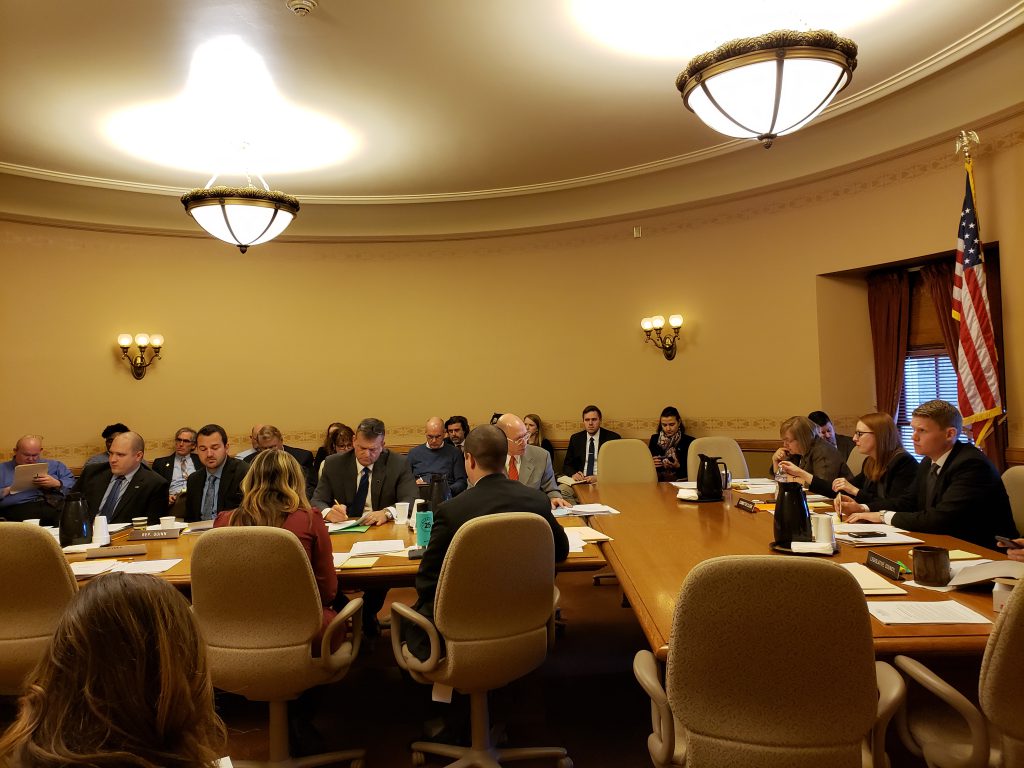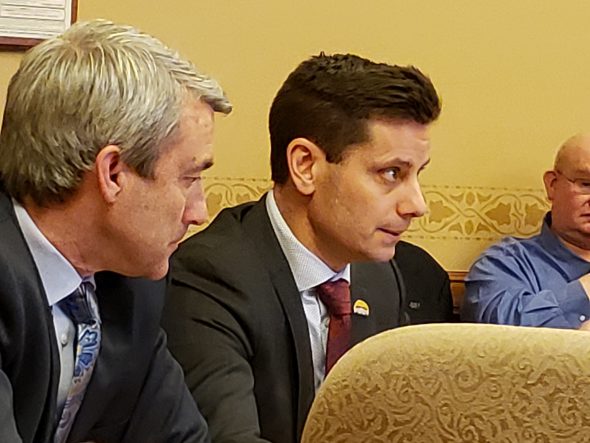State Occupational Licenses Under Scrutiny
Legislators, pushed by conservative groups, seek to review, relax occupational licensing.

The Assembly Committee on Regulatory Licensing Reform held a public hearing Wednesday on a bill to create a new step before lawmakers could implement new occupational licenses. Photo by Erik Gunn/Wisconsin Examiner.
Should a sign language interpreter have to pass a test and obtain a license in order to work? A massage therapist? A real estate agent? A barber or beautician? An architect?
A wave of legislation has been spreading across the country relaxing state occupational licensing rules, and for the second legislative term in a row, Wisconsin lawmakers are aiming to join the trend.
Companion bills in the state Assembly and the Senate would require that before the legislature could take up any proposals for new licensing requirements, the measures would first have to be evaluated on whether licensure is necessary to protect the public as well as what the cost and benefit would be.
Cutting back on licenses

From left, State Rep. Rob Hutton and state Sen. Chris Kapenga speak in favor Wednesday of a bill intended to limit new occupational licenses in Wisconsin. Photo by Erik Gunn/Wisconsin Examiner.
On Wednesday, the Assembly Committee on Regulatory Licensing Reform held a public hearing on the Assembly version, AB-605. It was the second hearing on the legislation; the state Senate Public Benefits, Licensing and State-Federal Relations committee held a public hearing on the counterpart SB-541 on Nov. 20, 2019.
The principal testimony for the legislation Wednesday came from its chief authors, state Sen. Chris Kapenga (R-Delafield) for the Senate version and state Rep. Rob Hutton (R-Brookfield) for the Assembly version.
“Nationwide, there is a bipartisan effort to rethink occupational licensing laws,” said Kapenga in prepared testimony. Citing a 2015 report issued by President Barack Obama’s administration, he added, “licensure reduces employment opportunities, lowers wages, creates barriers to interstate mobility, and increases costs for consumers.”
Since 1996, Kapenga said, when the state established its 93rd occupational license, the number of licensed occupations has risen by 78% to 166.
The new bill, he said, would establish “a sunrise review process” for every bill instituting a new occupational license that would assess the necessity of licensure to prevent harm to consumers and would include a cost-benefit analysis as well as a consideration of whether less-restrictive approaches than licensing could sufficiently protect the public.
“This legislation does not impact any existing licensed occupations,” Kapenga testified, “rather it provides lawmakers with helpful information as they consider new occupational licenses and the impact on the public as well as the professionals who are employed in the field.”
A new job for the Legislative Audit Bureau
As written, the bill assigns the responsibility for reviewing license proposals to the Department of Safety and Professional Services, but Kapenga testified that an amendment is being prepared that would instead require the Legislative Audit Bureau to undertake that task.
If the legislation is enacted, he said, Wisconsin would become the 14th state in the country to require a “sunrise” review of occupational license proposals.
“Sunrise reports analyze if there is any reasonable public benefit, if a less restrictive occupational regulation is more appropriate, how other states regulate the field, any financial burden that will be imposed on the individual, etc.,” Kapenga stated.
While most committee members indicated by their questions they generally supported the legislation, State Rep. Jonathan Brostoff (D-Milwaukee) was outspoken in his cross-examination of hearing witnesses.
“This seems to be part of a larger movement for an attack [aimed at] undermining licensure,” Brostoff told Kapenga at one point.
Hutton denied the accusation. “This legislation does nothing to question the merits of occupational licensing,” he said.
Besides Kapenga, other witnesses in favor of the bill included representatives of conservative policy and advocacy organizations the Badger Institute and Americans for Prosperity, both of which have campaigned for several years in favor of reducing occupational licensing requirements.
‘We want to protect people from being harmed’
Brostoff cited arguments made by deregulation proponents that consumer pressure and market forces could weed out bad actors in unlicensed professions: bad ratings on crowd-sourced internet review sites like Yelp; civil suits in the event of injury or harm to a consumer; or legal action accusing a business of unfair practices.
“All three of those are necessarily after the offense,” Brostoff said. “We want to protect people from being harmed.”
In an interview, Brostoff told the Wisconsin Examiner that he sees occupational licensing as a means of consumer protection. “The regulations we’ve developed around these issues have been incredibly, on balance, helpful for society.”
Such legislation is part of a nationwide effort, championed by, among others, the Charles Koch Institute, to sharply reduce occupational licensing laws. That has led some, particularly in organized labor, to be skeptical of the motives and arguments made on behalf of the proposals.
But two economists who have researched the subject closely told the Wisconsin Examiner that analyzing the impact of occupational licenses produces a complex picture.
Peter Q. Blair, of Harvard University and the National Bureau of Economic Research, said in an email that licenses can have a double-edged impact, particularly for jobseekers of color
“What we know from the body of research evidence is that occupational licensing raises wages but reduces employment,” Blair said.
Licensing opens doors for black men
He and Bobby Chung of the University of Illinois and Clemson University conducted research in which they found that in positions where a license requires an applicant to be free of any criminal record, “licensing reduces racial and gender wage gaps because it acts as a signal of non-felony status for African-American men,” Blair said.
To see what sort of disparate impacts licensing versus not licensing an occupation might have, policymakers might look at how licensing affects wages as well as job access based on demographics and on an applicant’s criminal history, he added.
“For some specific occupations, licensing raises wages and employment of people who are in the licensed occupations, but the cost of that is higher prices and less accessibility to consumers to those services,” Kleiner said.
But the choice isn’t between licensing or nothing, he added; there are other, less restrictive forms of vetting job applicants that can be applied in certain fields, such as professional certification.
And Kleiner doesn’t argue for eliminating licensing across the board.
“Certainly occupations where there are issues of health and safety and the potential of spread of disease or pandemic might provide a rationale for licensing,” he said. Any evaluation for or against licensing “needs to be done on an individual basis. That’s why I think it’s important that the states examine the cost in what consumers have to pay against the safety benefits.”
Reprinted with permission of Wisconsin Examiner.






















This seems to be another case of conservatives eliminating any minimal guarantees/protections for the consumer for services from a skilled trades person or a professional. I would guess that pretty soon someone could advertise themselves as psychotherapist, realtor or an investment professional without any qualifications. Conservatives think that harm that unlicensed professionals could do to consumers would be justified under their alleged “free market” mantra. One would just have to look at many of the for profit schools that have defrauded students and gone bankrupt to see how this would work.